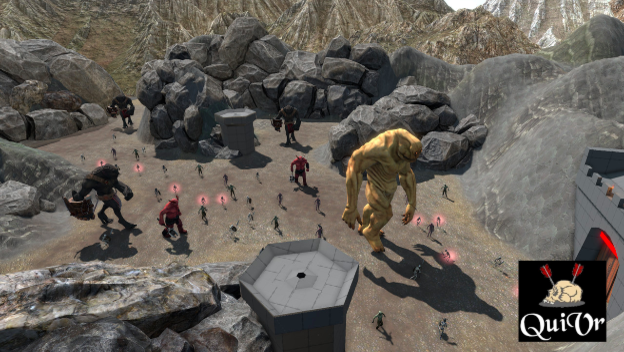Unfortunately, it seems that VR is no stranger to sexual harassment any more than other media. One gamer named Jorden Belamire was brave enough to post about her experience. She was playing a game called QuiVR, a game very much still in its alpha phase and can be played as a demo on the HTC Vive. Belamire was in multiplayer mode and shooting down monsters with her bow and arrow with a few other unknown users. Then someone, under the username BigBro442, decided it was a grand idea to cop a feel. The player approached Belamire and “rub[bed her] chest”. If that weren’t enough, “even when [she] turned away from him, he chased [Belamire] around, making grabbing and pinching motions near [her] chest. Emboldened, he even shoved his hand toward [her] virtual crotch and began rubbing.”
Sexual harassment has been an unfortunate feature of gaming communities almost since games were invented. It’s happening even in VR worlds and I am sure Belamire is the not the first, simply the first to get the attention of the press. With VR, this situation has clearly been able to escalate to a point where it can no longer be ignored. The question should not be if sexual harassment is possible in VR or video games, but what to do about it.
The developers of QuiVR, Aaron Stanton and Jonathan Schenker, caught wind of the incident and immediately integrated a solution. They included a “personal bubble” that “you can still turn it on via the settings …[or] putting your hands together, pulling both triggers, and pulling them apart as if you are creating a force field.” The is instant and quite dramatic, “a ripple of force expands from you, dissolving any nearby player from view, at least from your perspective, and giving you a safety zone of personal space.” It affects other players too, as “any player that teleports next to you will fade away as they approach – and in reverse, you’ll fade from their perspective as they approach… Other player’s voice audio is automatically muted, and you’re given the option to select who you want to hear again.” The “personal bubble” will soon be an open-source code for other VR developers to put in their games, as a “universal 911 for VR.”
As much as I think this bubble is a good start, I don’t think it’s the best solution. This too, can be abused. Especially in a close combat player vs. player situation, it’s the perfect way to eject people from their session. I cannot imagine how frustrating it would be if you were about to make a kill shot and suddenly the player disappears. In something like Dark Souls III – Ashes of Ariandel (if it ever hit VR), I would probably rage quit if that happened to me.

Others, like game developer Brianna Wu, have suggested government regulation in the video game industry. She stated that “the men that make these games genuinely don’t seem to understand that it’s sexual assault. Women barely work on these teams, so there’s no voice of conscience. No one wants to see the government regulate the game industry. But the truth is, VR is such a powerful experience, your brain feels like it’s real.” I agree with Woo that though there are more and more women becoming part of game development everyday, female gamers are not represented as well as they could be. However, regulation is so much more wrong than a bubble. There is way too much going on in a video game, especially in VR, for any kind of government regulation. Every game and situation is so different, it would extremely difficult to come up with a blanket law that prevents sexual harassment in all of them.
In my opinion, sexual harassment should be treated with just as much care and vigour as cheating. There needs to be a reporting system that can be easily accessed during gameplay – this could allow for the developers themselves to judge a situation per context if necessary. Warnings before a session begins would be a good addition to this. Pressing X could bear the same connotation as signing a terms of agreement, so that the player can be prepared for what might happen in the game and what other players are capable of doing.
So let’s not wonder whether or not sexual harassment exists in games – it does, no question. It does not warrant government regulation, however, and though a personal bubble is a good start, is not a permanent solution. There need to be warnings and a reporting system with punishments just as heavy-handed as the crime of cheating.
